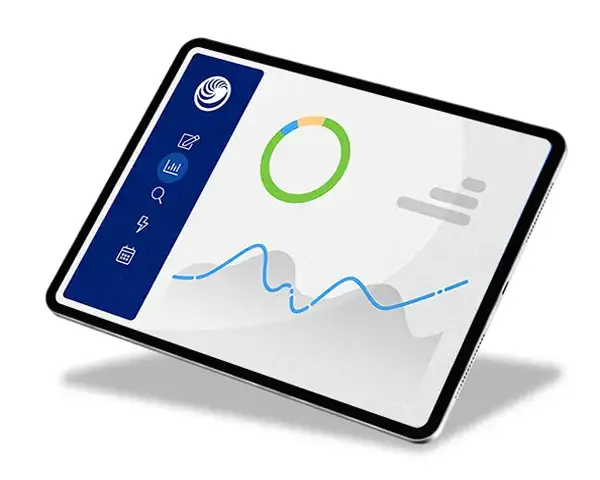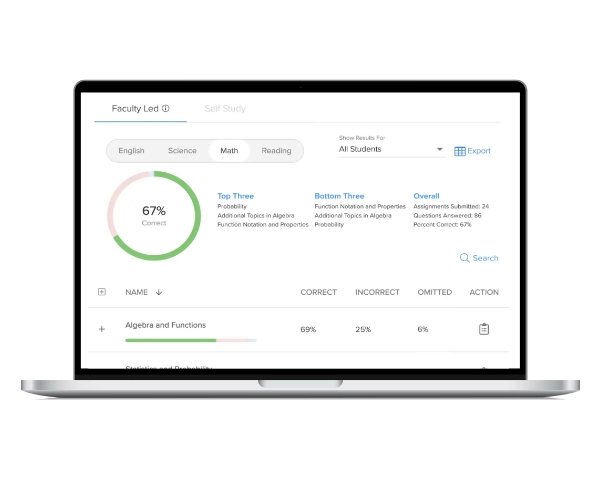Are your students’ AP® exam scores stagnant despite your best teaching efforts? You’re not alone. Many AP educators and administrators face similar challenges, but understanding the root causes can help you implement effective solutions. Here are five common reasons AP scores don’t improve and actionable solutions to address each issue.
Reason #1: Lack of Quality Data Analyses
The Problem:
Without accurate and comprehensive data, it’s challenging to make informed decisions about your AP program. The data you need often involves multiple stakeholders, including counselors and AP coordinators, so gaining access to it isn’t always a simple process. Waiting for the College Board® to release test scores can delay your analysis, too. Additionally, sifting through this data to identify trends and areas for improvement requires dedicated time and resources, which can be scarce. This lack of actionable data hinders your ability to strategically plan and implement necessary changes, ultimately impacting your students’ AP exam scores.
The Solution:
Collaborate with counselors and AP coordinators to gather comprehensive data on AP participation, exam scores, and curriculum effectiveness. By collecting data through standardized means, like common AP Unit assessments, and analyzing it collectively, you can identify trends, strengths, and areas for improvement. This team approach ensures everyone is invested in the process and allows for diverse perspectives and innovative solutions, ultimately leading to improved AP scores across the board.
Reason #2: Lack of AP Teacher Evaluations and Support
The Problem:
Effective AP instruction requires continuous professional development and support, but many schools face challenges in providing these resources. Evaluating teacher performance can be difficult, especially when dealing with varied teaching styles and student outcomes. Some teachers might excel in engaging students but struggle with getting high scores. Others might have high scores but low student participation. Without proper evaluation and support, teachers may not reach their full potential, directly affecting student performance and retention in AP courses.
The Solution:
Addressing staffing needs and allocations requires tough but necessary conversations. Approach these discussions with a supportive mindset, asking, “What can we do to support you with this?”
- For teachers whose students frequently drop AP courses after six weeks: Offer targeted professional development to enhance their instructional strategies.
- For teachers with low participation but high scores: Implement strategies to boost student class enrollment.
- For teachers with high participation but low scores: Provide additional instructional resources and mentorship.
These tailored supports can improve teaching efficacy, boost student retention, and enhance overall AP performance.

Reason #3: Inadequate Resource Access & Utilization
The Problem:
The success of an AP program heavily relies on the quality and utilization of instructional materials. However, many schools either lack access to high-quality resources or fail to implement them in the most effective way. Teachers might use outdated or irrelevant materials that don’t align with current AP standards. Additionally, without proper training, even the best resources can go underutilized. This gap in resource quality and usage results in students not receiving the comprehensive support they need to excel, thereby stagnating their AP scores.
The Solution:
Regularly evaluate the resources your AP teachers use. Are they effective? How do you know? Identify gaps and seek out quality materials that align with your goals. UWorld offers exceptional AP tools that support new and veteran teachers, helping students prepare effectively for AP exams and succeed in class. Ensure teachers are trained to utilize these resources fully, maximizing their potential. Providing the right resources and training can lead to more effective teaching and ultimately higher AP outcomes.
Reason #4: Underutilized Summer AP Opportunities
The Problem:
Summer provides a valuable window for students and teachers to prepare for the upcoming academic year, but many schools miss this opportunity. Without structured programs such as AP summer boot camps, students may not get the necessary preparatory support. Similarly, teachers who don’t engage in professional development during the summer miss out on crucial training and collaboration opportunities. Failing to leverage the summer months means students and teachers start the year at a disadvantage, affecting overall AP performance.
The Solution:
Summer is a prime time to support students and teachers. Host AP summer boot camps for new students and those who might struggle, front-loading key units to build confidence. Encourage teachers to attend AP Summer Institutes (APSIs) for professional growth and promote participation in AP readings to gain deeper insights. Use this time for professional development and building AP cohorts to foster a collaborative environment. Using the summer effectively prepares students for the upcoming year, enhances teacher skills, and fosters a sense of readiness and confidence that can translate into improved AP performance.
Reason #5: Lack of Culture for AP Successes
The Problem:
Creating an environment that celebrates and promotes AP achievements is essential for sustained success. Without a strong culture, students may lack motivation and awareness about the benefits of AP courses. This can result in lower enrollment and retention rates. Additionally, if teachers and counselors aren’t actively involved in fostering this culture, students might not receive the encouragement and support they need. A lack of celebration for successes and minimal promotion of AP courses can lead to a disconnect between students and the AP program, hindering its overall impact.
The Solution:
Celebrate and promote AP success at every opportunity. Invite alumni who excelled in AP courses to share their experiences and inspire current students. Engage counselors in active recruitment and retention efforts. Recognize and celebrate student achievements, creating a buzz around AP courses. Building excitement and a supportive environment can significantly boost participation and performance.
Key Takeaways
Improving AP scores requires a multifaceted approach. You can create an environment where students thrive by effectively managing data, supporting and evaluating teachers, utilizing quality resources, making the most of summer opportunities, and fostering a culture of AP success. Implement these strategies to see meaningful improvements in your AP program.
Discover how UWorld’s Courses for AP can help you increase student support and AP scores, providing a simple solution for program success.





